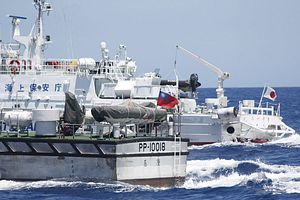Ankit and I were joined on the podcast this week by Clint, our Tokyo-based editor and residential Japan expert, who runs the new Tokyo Report blog. Not surprisingly, the topic of discussion or the podcast was Japan’s reinterpretation of Article 9 of its constitution to allow for collective self-defense.
As is probably clear from listening to the podcast, there were slight disagreements on a couple of issues between Ankit and Clint on the one hand, and myself on the other. First, I felt that the purpose of the reinterpretation was to finally provide Japan with the inherent right to collective self-defense as enshrined in Article 51 of the UN Charter. Clint assured me that the reinterpretation was aimed at being much more limited.
Having the chance to read up more on the subject, I am unsurprised to learn that Clint was correct (after all, he is our resident Japan expert). First, unlike Article 51 which provides nations with the inherent right to come to the aid of allies even if the states themselves are not directly threatened, the reinterpretation of Article 9 only allows Tokyo to come to the defense of allies if it can be tied directly to its own defense. As the vice president of New Komeito, LDP’s coalition partner, Kazuo Kitagawa explained: “Collective self-defense under international law means defending other countries without considering if that would infringe on one’s own security, but we see this as part of the self-defense of Japan.”
Second, because of pressure from New Komeito, the revision doesn’t explicitly give Japan the right to collective self-defense, but rather says that some actions that are permitted could be construed as collective self-defense.
The other point of disagreement was over where Japan would apply it. We all agreed that it would be applied to its alliance with the U.S., and possibly in certain actions related to the Korean Peninsula, such as shooting down North Korean ballistic missiles headed for the United States (South Korea once again reiterated after this revision that it opposes Japan intervening on the Korean Peninsula without its explicit approval).
I argued, however, that one of the unsaid aims of the revision was to give Japan the ability to intervene on behalf of Taiwan if the People’s Republic of China ever sought to seize the island by force. Clint and Ankit were highly skeptical that this was the case.
After reading up more on the new revision, I still believe that this is the case. For example, the Japan Times explains that under the reinterpretation, three conditions must be met to allow Japan to come to the aid of a partner nation:
“The attack on that country poses a clear danger to Japan’s survival or could fundamentally overturn Japanese citizens’ constitutional rights to life, liberty and the pursuit of happiness.
“There is no other way of repelling the attack and protecting Japan and its citizens.
“The use of force is limited to the minimum necessary.”
Previously it reported that the final draft of the Cabinet document said Japan could intervene militarily “when an attack on a country that ‘has close relations’ with Japan ‘poses a clear danger of threatening our country’s existence and fundamentally overthrowing our people’s lives, freedom and right to pursue happiness.’”
This seems to apply to Taiwan. As The Diplomat has noted, no country in Northeast Asia has as close and friendly of relations with Japan as Taipei. Secondly, China conquering and occupying Taiwan would present about as clear a danger to Japan’s survival as any event short of an attack on Japan itself. The Senkaku Islands are roughly half the distance from Taiwan as they are from mainland China, which would allow Beijing to bring far more force to bear in an attack on them. It would also allow Beijing to approach the islands from roughly two different directions. Furthermore, Taiwan’s strategic location would greatly enhance China’s ability to interdict maritime shipping to and from Japan.
Thus, China’s occupation would be a threat to both Japan’s territorial integrity as well as the “lives, freedom and right to pursue happiness” of the Japanese people. If the PLA was in the midst of an invasion of Taiwan, it’s hard to imagine any other way of repelling the attack then through intervening in support of Taiwan. In any case, one of the examples openly being espoused as an example of when Japan would exercise collective self-defense is when a U.S. ship came under attack on the high seas. This would almost certainly happen if America intervened in support of Taiwan, which would allow Japan to join the fight.
Thus, I think at the very least Japan’s right of collective self-defense is meant to apply to a Chinese invasion of Taiwan, even if this is left unsaid for obvious diplomatic reasons.

































